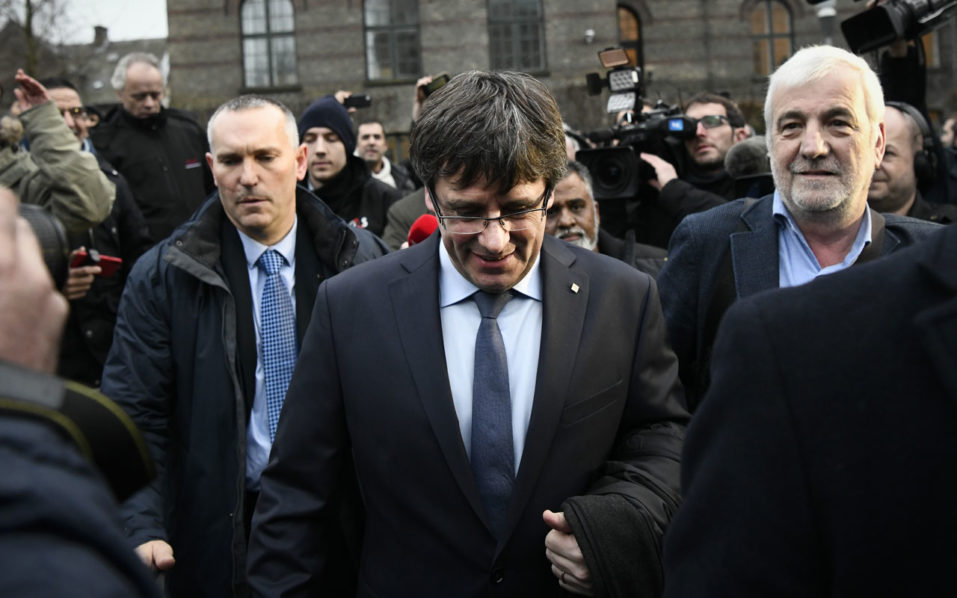
Catalonia was plunged into further uncertainty Tuesday as the region’s parliamentary speaker postponed a crucial vote to reappoint ousted separatist president Carles Puigdemont but vowed to have him reinstated at a later date.
Roger Torrent announced he had delayed the parliamentary session to ensure it could later go ahead in an “effective” way after Spain’s Constitutional Court ruled against it, drawing protests from Puigdemont’s Together for Catalonia grouping but welcomed by Madrid.
But he staunchly defended Puigdemont’s right to be reappointed despite his self-exile in Belgium after separatist parties won an absolute majority in December elections and the former regional leader was officially designated as candidate for the presidency.
“The Spanish government and the Constitutional Court are trying to violate the rights of thousands of Catalans who went to the polls on December 21 and we won’t allow that,” Torrent, also a separatist, told reporters.
Puigdemont still candidate
“I won’t propose any other candidate,” he said, putting paid to speculation that separatists might drop Puigdemont and pick another candidate.
Puigdemont, who left for Belgium shortly after he was sacked by Madrid after Catalonia’s parliament declared independence in October, faces arrest if he returns to Spain for leading the secession bid in the deeply divided northeastern region.
Catalan lawmakers had been due to formally vote him into office on Tuesday afternoon.
But the Constitutional Court ruled on Saturday — in response to a lawsuit filed by the central government — that Puigdemont must be present at the assembly to be chosen as the region’s chief, causing uncertainty over whether the parliamentary session would go ahead.
The court also warned that swearing in Puigdemont at a distance, by videoconference as some of his supporters have proposed, would not be valid.
And it ruled that Puigdemont must ask a Supreme Court judge leading the investigation into his role in Catalonia’s independence push for permission to attend the parliamentary session.
‘Fugitive living in Brussels’
The latest episode in the secession saga comes three months after the assembly’s failed declaration of independence on October 27, which deeply divided Catalans and triggered Spain’s worst political crisis in decades.
Prime Minister Mariano Rajoy moved to stop the crisis by imposing direct rule on the semi-autonomous region, sacking its government including Puigdemont, dissolving parliament and calling snap elections.
But in a major setback for the central government, separatist parties once again won a majority of 70 seats in the 135-seat parliament in the December polls.
While separatist parties won less than half the vote, 47.5 percent, they benefited from electoral rules giving greater weight to rural areas, where support for independence is higher.
Separatists argue that Puigdemont was given a democratic mandate for the independence declaration during a contested referendum, which the courts and the central government declared illegal, and want to see him reinstated. But Madrid remains fiercely opposed to his return to power.
“You can’t be a fugitive living in Brussels and expect to be elected president of a democratic institution,” Rajoy said Tuesday in an interview on Spanish television.
Separatist divisions?
Torrent had risked criminal charges if he disobeyed the Constitutional Court by going ahead with the parliamentary session and having Puigdemont reappointed remotely on Tuesday.
But Together for Catalonia denounced his decision to postpone the session, saying it should have gone ahead Tuesday.
In a statement, it said Torrent did not consult with members of Puigdemont’s grouping over his decision, nor did he tell them before announcing it.
Spain’s central government, meanwhile, welcomed the move, saying it had avoided making a “mockery of our democracy.”
“The separatists know they have to obey the law like all other citizens,” it said in a statement.
But it is unclear what will happen next.
A top lawmaker with the separatist Esquerra Republicana de Catalunya party, Joan Tarda, said over the weekend it may be time to “sacrifice” Puigdemont although there is no obvious alternative.
But Torrent’s defence of the former Catalan leader makes this unlikely. A stalemate could eventually lead to new elections.
[ad unit=2]



